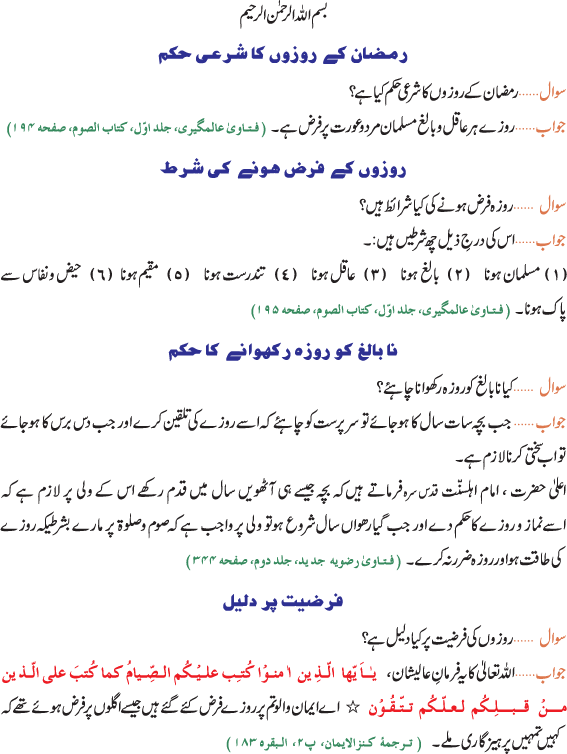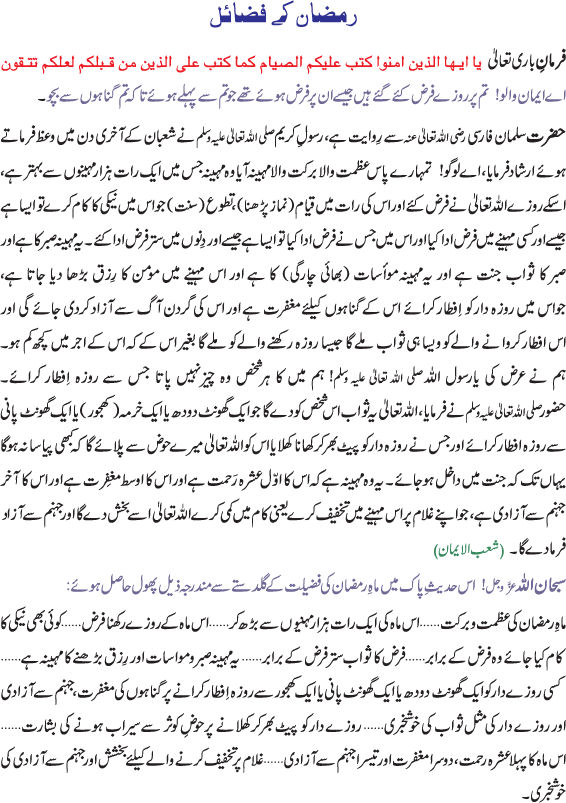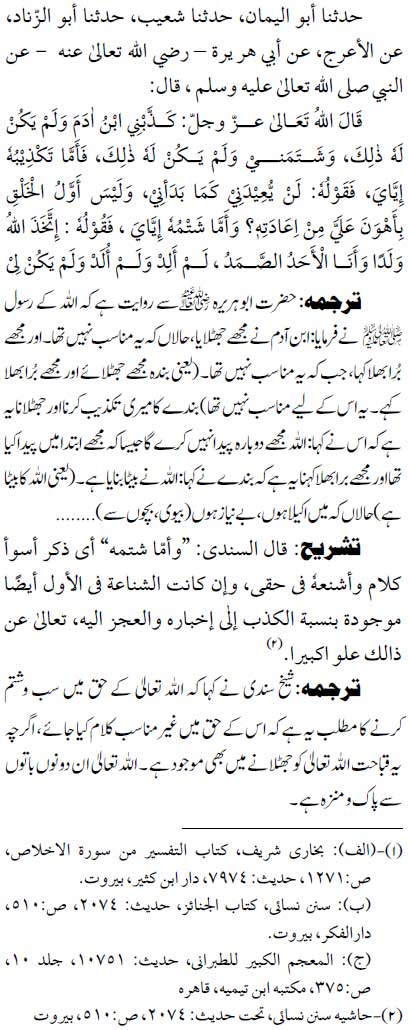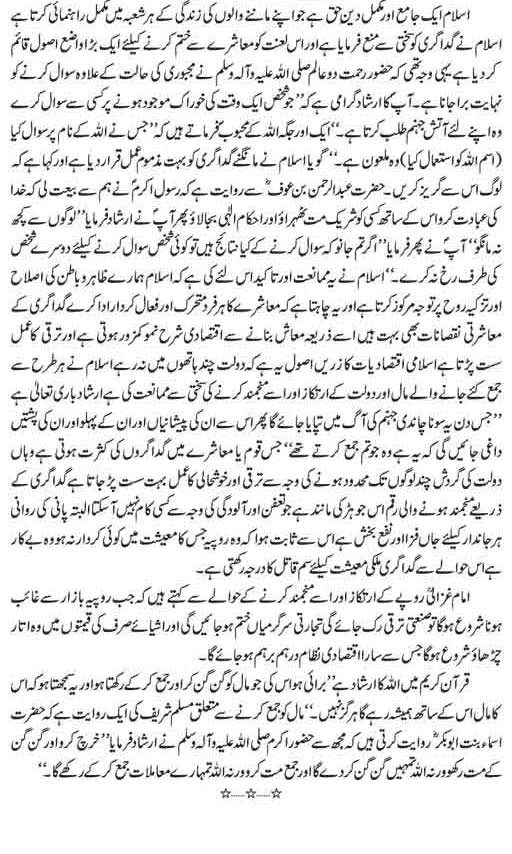
Ramadan Kay Rozon Ka Sharai Hukum
Will There Be More Men Or Women In Paradise?
Men and women engaged in this dispute when the Sahaabah were still alive. Muslim reports from Ibn Sireen: “Men and women disputed as to which of them would form the majority in Paradise. According to another report, either they were competing, or they were discussing, whether there would be more men or women in Paradise. They consulted Abu Hurayrah, who said that women would form the majority, on the basis of the words of the Prophet (saw): “The first group to enter Paradise will be as beautiful as the full moon, and the group that follows them will be like the brightest shining stars in the sky: each man of them will have two wives, the marrow of whose leg-bones will be visible through the flesh because of their extreme beauty. There will be no one who is unmarried in Paradise” [Sahih Muslim, Kitaab al-Jannah, Baab awwal zumrah tadhkul al-Jannah, 4/2179, hadith no. 2834]
This hadith clearly indicates that there will be more women than men in Paradise. Some others thought that there would be more men, because of the hadith, “I saw that they [women] formed the majority of the people of Hell”. The response to this is the fact that women will form the majority of the inhabitants of Hell does not necessarily mean that they will be a minority in Paradise, as Ibn Hajar al-‘Asqalaani said [Fath al-Baari 6/325]
The two hadiths may be reconciled by stating that women will be in the majority in both Paradise and Hell, just as there are more women than men in this world. We could say that the hadith narrated by Abu Hurayrah indicates that the total number of women in paradise, including women of this world and al-Hoor al-‘Eeyn, will outnumber men. The question then is, who will be greater in number in Paradise: the men of this world or the women? al-Qurtubee reconciled these two hadiths by suggesting that women will form the majority of the inhabitants of Hell before the Shafaa’ah [intercession] when the sinners from amongst the muwwahideen will be brought out of Hell. Thereafter women will form the majority of the people of Paradise. [at-Tadhkirah, al-Qurtubee, p. 475]
- March, 13
- 2375
- Paradise-Hell
- More
Mah-e-Ramadan k Fazail

Mah-e-Ramadan k Fazail
The Origin of Zamzam Well
Explaining the origin of Zamzam Ibn ‘Abbas said: “When Hajar reached the (mountain) of Marwah in search of water for her baby son Isma’il and herself to quench their thirst. she heard a sound, and said to herself, “Quiet.” She again heard the sound, whereupon she said, “I have heard you. Help me, if you can.” All of a sudden she found an angel at the place where now Zamzam is. He either dug it with his heel or touched it (the ground) with his wing and a spring of water appeared. Hajar encircled the water with soil. She took some water in a container she had, and water kept bubbling up unchecked.”
Ibn ‘Abbas reported that the Prophet (peace be upon him) said, “‘May Allah shower His mercy on Isma’il’s mother. Had she left it untouched, or (the narrator is not sure) the Prophet said, had she not drunk of its water, the Zamzam would have turned into a clear flowing spring.’ He added, ‘So she drank the water and gave some to her son.’ The angel said to her, ‘Fear no loss because this is the site of Allah’s House, which this boy and his father shall build. Allah never permits His servant to be lost. At the site of the House was a hill that was split by flood waters running down its right and left.”‘
Fiqh-us-Sunnah
Fiqh 5.82
Hadith Qudsi: Allah Ki Takzeeb Na Karo

Hadith Qudsi: Allah Ki Takzeeb Na Karo
Historical Background Of Sa’i Between Safa and Marwah
Ibn ‘Abbas said: ‘Prophet Ibrahim (peace be upon him) brought Hajar, his wife, and her son Isma’il (peace be upon them), whom she was still nursing, and left them at (the site of) the House of Allah under a tree above the Zamzam. Makkah at that time was a place where there was neither water nor any dweller. He left a bag of dates and a container of water for them. Then Ibrahim (peace be upon him) turned to go away. Isma’il’s mother said to him, “O Ibrahim! Where are you going? And who are you leaving us to in this valley without a companion or a thing?” She repeated this several times but he did not respond. At last, she asked him, “Has Allah commanded you to do so?” He answered, “Yes.” Thereupon she said, “Then He will not let us perish!” (Bukhari) In another narration, we
read: “She asked him, ‘Who are you leaving us to?’ He answered, ‘To Allah’ where she responded, ‘I am satisfied,’ and turned back.”
Ibrahim left and when he reached a mountain pass where he could no longer see them, he turned his face toward the Kaaba and with his hands raised, supplicated, “O Our Lord! I have made of my offspring to dwell in a valley without cultivation by your Sacred House; Our Lord, that they may establish regular prayer: so fill the hearts of some among men with love towards them, and feed them with fruits, so that they may give thanks!” (Qur’an 14.37)
Hajar sat under the tree with her baby next to her. She drank from her water container hanging nearby, and nursed her baby, until all the water she had was gone, and her milk dried out. Her son grew hungrier and hungrier. She could hardly bear to look at him. She went and stood at Safa – the hill nearest to her. She looked down the valley to see if someone was around to help. She could see no one. So, she climbed down Safa and reached the valley. She struggled hard, crossed the valley, and reached Marwah. She stood on Marwah and looked around. Still, she could see no one around. She repeated this seven times. Ibn ‘Abbas added, “The Prophet (peace be upon him) said: ‘It is (to commemorate this walk) that pilgrims walk between Safa and Marwah.”‘
Fiqh-us-Sunnah
Fiqh 5.85
khajoor Aur Anar Kay Fazail

khajoor Aur Anar Kay Fazail
Have You Made Your Will?
‘It is not right for any Muslim who has anything to bequeath that they may pass even two nights without having their will written.’ (Prophet of Allah (saw))
Under English law, if someone dies without having written a will his or her property does not automatically pass on to those who the deceased would have chosen to be the natural inheritors. Furthermore, inheritance tax may have to be paid to the government from the estate of the deceased, and many legal complications will have to be sorted out to save the distress of the deceased’s heirs.
In Britain, about 70% of people die without making a will, this means that their hard-earned property – their home, savings, and personal belongings – are not distributed amongst their relatives as they would have liked.
Making a will is simple. However, to maker sure that your will is legally valid you should get professional advice from a solicitor. A Muslim solicitor will be in a better position to help you in matters of dividing your estate according to Shari’ah (Islamic Law).
Before seeing a solicitor you should make sure of the following:
Calculate the value of your estate Your estate is money, land, property, and all other material possessions after deducting all your liabilities such as outstanding debts, loans, etc.
Appointment of executor(s) Executor(s) is the persons who carry out the instructions contained in a will. You can choose between one and four people such as your spouse, relative, a friend, or anyone whom you trust. It can even be your solicitor or a combination of these people.
Find two witnesses Witnesses cannot be the people who will benefit from your will.
Appoint a guardian If you have any children under the age of 18 years, it is advisable to appoint a guardian for them in case they are left without both parents. Make sure the appointed guardian is willing to take responsibility.
A will according to the Shari’ah should contain the following:
A declaration of your faith in Islam.
Instructions to the executors/relatives of your will to bury your body according to the rites prescribed in Islam.
Directions to your executors/relatives to pay your funeral expenses and debts including debts to Allah (such as Zakah).
Directions to your executors and other authorities to pay legacies or bequests to charities, Islamic institutions, friends, or relatives who are not considered heirs under Islamic law.
This portion must not exceed one-third of your entire estate after burial costs, debts and other expenses have been paid, except when a person has no surviving blood relatives.
Directions to your executors and other authorities to divide the remaining two-thirds of your estate amongst your heirs into shares fixed according to Shari’ah (Islamic Law).
Legacies are usually gifts of money.
Bequests are usually gifts or items of property.
Estate is your money, property, and material possessions.
Leaving Sadaqah
Leaving a contribution in your will in the form of sadaqah to some charitable institution is surely a great and noble decision. It will be deemed as sadaqah-i-jariah (an everlasting sadaqah).
In your will, you can leave parts of your estate as sadaqah, such as:
A gift of money.
An item of value such as a house, a car, etc.
A share of your residuary estate (the residuary of your estate is the sum total left after paying out debts, bills taxes).
Gada Gari Ki Sakht Mumaniat

Gada Gari Ki Sakht Mumaniat
A Brief History Of Hadith Methodology
As time passed, more reporters were involved in each isnad (chain of narrators), and so the situation demanded strict discipline in the acceptance of Ahadith; the rules regulating this discipline are known as Mustalah Al-Hadith (Hadith methodology).
Among the early traditionists (muhaddithun, scholars of Ahadith), the rules and criteria governing their study of Hadith were meticulous, but some of their terminologies varied from person to person, and their principles began to be systematically written down, but scattered among various books; for example, in Ar-Risalah of Ash-Shafi`i (d. AH 204), the introduction to the Sahih of Muslim (d. AH 261) and the Jami of At-Tirmidhi (d. AH 279). Many of the criteria of early traditionists, for example, Al-Bukhari, were deduced by later scholars from a careful study of which reporters or isnads were accepted and rejected by them.
One of the earliest writings to attempt to cover methodology comprehensively, using standard (generally accepted) terminology, was the work by Ar-Ramahurmuzi (d. AH 360). The next major contribution was Ma`rifat Ulum Al-Hadith by Al-Hakim (d. AH 405), which covered 50 classifications of Hadith, but still left some points untouched; Abu Nu`aim Al-Asbahani (d. AH 430) completed some of the missing parts to this work. After that came Al-Kifayah fi `Ilm ar-Riwayah of Al-Khatib Al-Baghdadi (d. AH 463) and another work on the manner of teaching and studying Ahadith. Later scholars were considered to be greatly indebted to Al-Khatib’s work.
After further contributions by Qadi Iyad Al-Yahsubi (d. AH 544) and Abu Hafs Al-Mayanji (d. AH 580) among others, came the work which, although modest in size, was so comprehensive in its excellent treatment of the subject that it came to be the standard reference for thousands of scholars and students of Hadith to come, over many centuries until the present day: `Ulum al-Hadith of Abu Amr `Uthman Ibn As-Salah (d. AH 643), commonly known as Muqaddimat Ibn As-Salah (Muqaddimah of Ibn As-Salah), compiled while he taught in the Dar Al-Hadith (Hadith school) of several cities in Syria. Some of the numerous later works based on that of Ibn As-Salah are these:
Al-Irshad, an abridgment of Muqaddimah, by An-Nawawi (d. AH 676), which he later summarized in his Taqrib. As-Suyuti (d. AH 911) compiled a valuable commentary on the latter entitled Tadrib Al-Rawi.
Ikhtisar `Ulum al-Hadith by Ibn Kathir (d. AH 774); Al-Khulasah by Al-Taibi (d. AH 743); Al-Minhal by Badr Ad-Din ibn Jama`ah (d. AH 733); Al-Muqni` by Ibn Al-Mulaqqin (d. AH 802); and Mahasin al-Istilah by Al-Balqini (d. AH 805 ), all of which are abridgments of Muqaddimat Ibn As-Salah.
Nukat by Az-Zarkashi (d. AH 794); At-Taqyid wal-Idah by Al-`Iraqi (d. AH 806); and An-Nukat by Ibn Hajar Al-`Asqalani (d. AH 852), all of which are further notes on the points made by Ibn As-Salah.
Alfiyyat al-Hadith by Al-`Iraqi, a rewriting of Muqaddimah in the form of a lengthy poem, which became the subject of several commentaries, including two (one long, one short) by the author himself; Fath Al-Mughith by As-Sakhawi (d. AH 903); Qatar Ad-Durar by As-Suyuti; and Fath Al-Baqi by Sheikh Zakariya Al-Ansari (d. AH 928).
Other notable treatises on Hadith methodology include the following:
Al-Iqtirah by Ibn Daqiq Al-`Id (d. AH 702); Tanqih al-Anzar by Muhammad ibn Ibrahim Al-Wazir (d. AH 840), which was the subject of a commentary by Al-Amir As-San`ani (d. AH 1182).
Nukhbat Al-Fikr by Ibn Hajar Al-Asqalani, again the subject of several commentaries, including one by the author himself, one by his son Muhammad, and those of Ali Al-Qari (d. AH 1014), `Abdur-Ra’uf Al-Munawi (d. AH 1031) and Muhammad ibn Abdul-Hadi As-Sindi (d. AH 1138). Among those who rephrased the Nukhbah in the poetic form are At-Tufi (d. AH 893) and Al-Amir As-San`ani.
Alfiyyat Al-Hadith by As-Suyuti, the most comprehensive poetic work in the field; Al-Manzumah by Al-Baiquni, which was expanded upon by, among others, Az-Zurqani (d. AH 1122) and Nawab Siddiq Hasan Khan (d. AH 1307); Qawaid At-Tahdith by Jamal Ad-Din Al-Qasimi (d. AH 1332).
Tawjih an-Nazar by Tahir Al-Jaza‚iri (d. AH 1338), a summary of Al-Hakim’s Ma`rifah.

